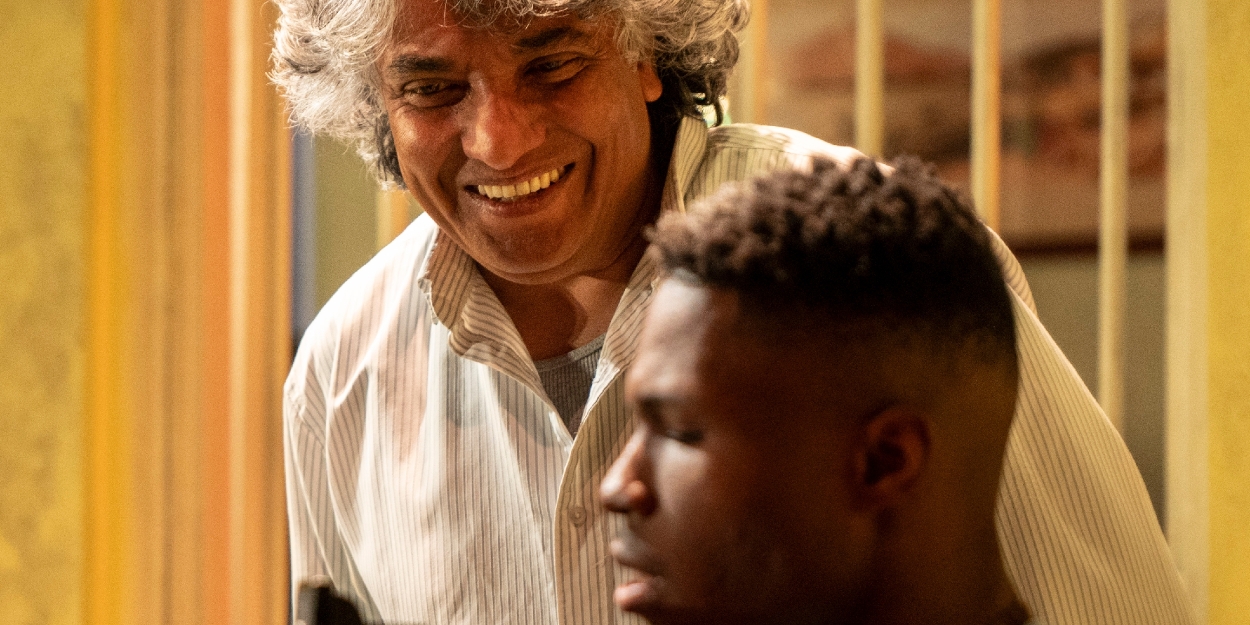
When Britain colonized India, it left behind some Puritanical laws to which Shayok Misha Chowdhury refers in the title of his play, Public Obscenities, at Woolly through December 23. Come to think of it, they stuck us with some similar Puritanical notions as well, which may be why the USA currently seems so obsessed with identities, bodies, pronouns, and what everyone does in bed. But this engrossing and really just garden variety R-rated play (the title misleads: no obscenities occur during the 3-hour production) reveals the far-from-Puritanical ethos of modern India to its protagonist, Choton, as well as a whole lot more about his family.
Choton, sturdily played by Abrar Haque, is a Ph.D. student from India who's been raised in the US. He has come to Kolkata, where he stays with his aunt and uncle, to do research for his dissertation on the LGBTQ community in India. With him is Raheem, the excellent Jakeem Dante Powell, his lover who also serves as the media expert for the interviews Choton's grant necessitates. Though Choton speaks fluent Bangla and seems to be bi-cultural, what he will learn during his visit is how much more American than Indian are some of the social/sexual constructs that he carries and how much more liberated many Indians have always been.
The aunt and uncle (performed with skill and outstanding energy by Gargi Mukherjee and Debashis Roy Chowdhury) don't seem unusual. Their ordinary home, designed with detail by Peiyi Wong, looks plain but comfortable; yet the homey surface belies the discomfort between them. (Also, the word "homely" translates to Bangla in ways imperceptible to English-speakers.) Proving Tolstoy's theorem by being unhappy in their own way, they're charming with Raheem, supportive of Choton, distant to a guest, unpleasant to their housekeeper, dreadful to each other. Mukherjee and Chowdhury smoothly manage these shifts and variegations and do so in two languages. Subtitles are probably the simplest projection task in Johnny Moreno's complex and excellent projection and video plot. His cinematic image of Lake Mosque creates a stunning backdrop for a scene in Act II, #10 Field Work.
During Field Work, Choton interviews Shou (Tashnuva Anan) for the second time. She's a Working Girl who has responded to Choton's posts on Grindr seeking interviewees for his dissertation research. Along with Raheem, it is from Shou that Choton learns more about what he ought to learn--that real people don't fit well into sociologically tagged little boxes. Anan lights up the stage whenever she's on it. In Act I, she breaks into song and dance, and during Field Work, she warmly responds to Choton's neediness when the interview becomes more conversation than dissertation.
Powell and Haque make a fine couple. Chowdhury's strength lies in thorough character development which is why Public Obscenities wouldn't work as a 90-minute one-act; rather, the play is a substantial piece of dramatic literature with the same kind of meat on its bones as A Raisin in the Sun or Death of a Salesman. The writer, who also directed this production, gives these actors a range of situations to make their relationship deeply real. It has friendship, anger, humor, comfort, sex, kindness, collaboration, and it's refreshing to see young people depicted as multi-dimensional. Powell and Haque meet the range, and match each other's skills.
The most multi-dimensional character in Public Obscenities may be the one who says the least. Jitesh, the housekeeper, seems like a Chekhovian "old retainer" who has served a family long, well, and invisibly. But none of Chekhov's servants can gloriously sing folk songs one minute and turn out to be key to the plot the next. Golam Sarwar Harun's performance makes the difficult job of portraying someone who is self-effacing look easy; it's not, and he's terrific.
Though caste is barely referred to in Public Obscenities, the connection that the African-American Raheem seems to make with Jitesh hints at the suggestion that their societies have (mis) treated them in similar ways.
Public Obscenities, which won a Drama Desk Award earlier this year in New York, contains outstanding storytelling at an unusually natural pace. Woolly has done well to bring it to the Nation's Capital where such international and cross-cultural topics deserve attention.
(Photo by Teresa Castracane)
Reader Reviews

Videos

